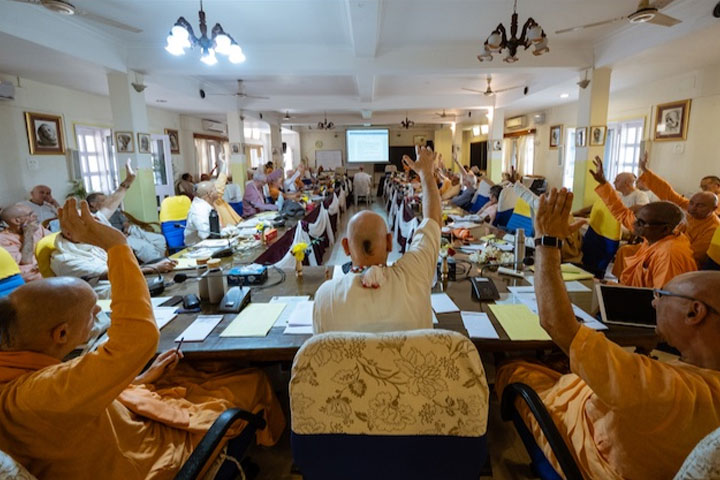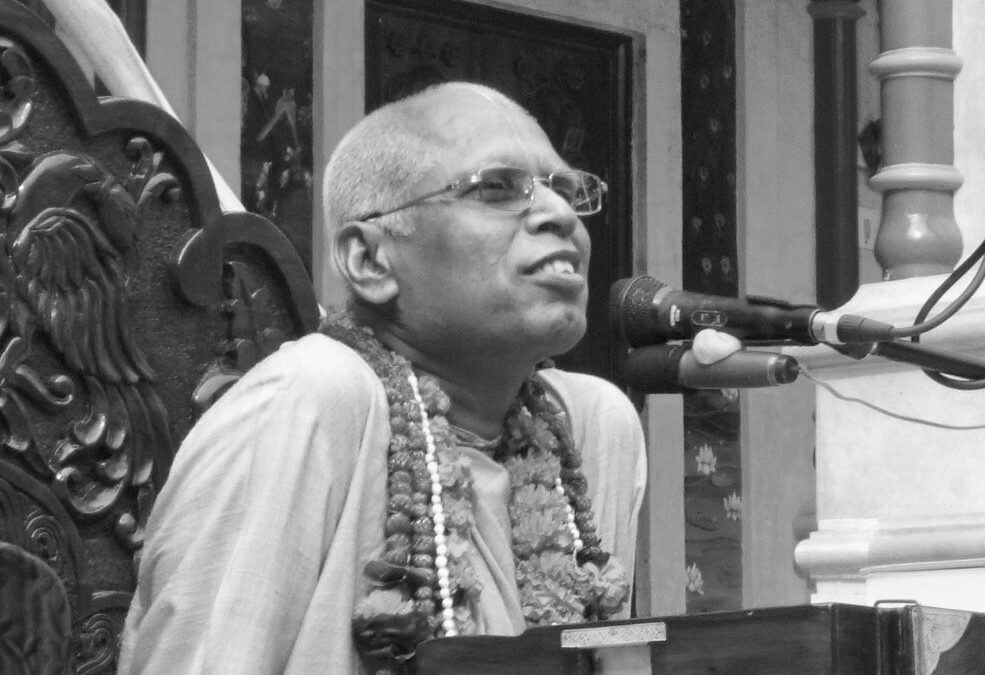GBC’s Untruthful “Account of Incident”

Brief Account of a 1990 Incident Involving H. H. Lokanath Swami the GBC Decision
Feb. 25, 1999
In 1993, a fourteen-year-old girl of Indian background lodged a complaint concerning H. H. Lokanath Swami before some members of the GBC. (The girl is a daughter of initiated ISKCON members who have long resided in America.) The girl asserted that about three years earlier, when she had been eleven years old and Lokanath Swami had been staying in her family’s home, incidents took place between them which made her feel sexually victimized by Lokanath Swami.
After receiving the girl’s complaint, it was arranged for a committee of seven GBC members to meet with Lokanath Swami as soon as possible. The GBC also arranged for the young girl to be interviewed, first by a female devotee whom the girl knew and trusted, and then by another female devotee who was a mental health professional in the field of child molestation.
The GBC committee had immediately suspended Lokanath Swami from initiating further disciples and restricted his movements while it undertook a complete investigation.
This is what the GBC committee found out: In 1990, while Lokanath Swami was leading the world-wide “Padayatra” program, he had suffered a broken leg. While convalescing with his right leg in a cast, he stayed for about seven days with a devotee family in America. During his sojourn, Lokanath Swami was frequently pressed by the father of the family to administer spiritual instruction and discipline to his children, especially to the youngest child, an eleven-year-old girl. During the course of Lokanath Swami’s interactions with the girl, the incidents occurred that the girl later reported.
She reported that Lokanath Swami sometimes sat uncomfortably close to her, when, for example, teaching her to play harmonium. Sometimes he would praise her by patting her and saying “Very good.” One morning, Lokanath Swami, who had been especially charged by the father with the task of getting the girl up on time, noticed that the girl was tardy. While chanting in his room, Lokanath Swami saw the girl in the room directly opposite his. In spite of the late hour, she was still wearing the long T-shirt that she used as a nightgown, and she was upset that he saw her. When he told her to go take her shower, she ran into her closet to hid from him. He made her come out, and as she ran past him, he said, “Go and take your shower!” and swatted her with his hand.
However, the incident that most distressed the girl took place one morning in the living-room. The two sat close together on a couch reading from a volume of the Krsna book, with Lokanath Swami’s servant going in and out of the room and the girl’s mother cooking in the adjoining kitchen. As they sat reading together, Lokanath Swami’s hand touched and moved across the girl’s upper thigh over her clothing. The psychologists who evaluated this matter had no doubt that the girl had undergone a disturbing and even traumatizing experience. When questioned, Lokanath Swami could recognize the various individual episodes that had caused her disturbance, and he confessed to the emergence in himself, during the incident of reading together, of shameful feelings.
In order to help determine the proper disposition of this case, the GBC sent Lokanath Swami to CAP Behavior Associates, Inc., a group of mental health professional that specializes in evaluating and treating clergy (from a variety of religious traditions) implicated in child molestation. The beginning of their written report outlines their procedure:
“The following is a summary of our evaluation of Swami Lokanath and is provided per the request of the patient in accord with the wishes of the Governing Body Commission of Isk[c]on. The evaluation was conducted over a two day period (6/25/93 & 6/26/93) and consisted of multiple clinical interviews (complete mental status, psychosocial and Psychosexual histories), the Minnesota Multiphasic Personality Inventory II, the Millon Clinical Multiaxial Inventory II, the Assault Knowledge Inventory, and the Rorschach Inkblot Test.”
The CAP Behavior Associates team also received a report from the psychotherapist who had interviewed the victim. After the evaluation was completed, members of CAP team met personally with some members of the GBC, explained their findings and answered questions. The following are their major findings:
1. Lokanath Swami is not a pedophile. He presents no danger to children.
2. Although the girl was young, she had begun the transition to womanhood, and Lokanath Swami did not sexually relate to her presence as that of a child.
3. Lokanath Swami had been brought up in a way that kept him entirely innocent of the experience of sexuality. He had not undergone the normal (or, at any rate, western) adolescent struggle of coming to grips with sexuality and sexual feelings. Thus, when he found himself put into close association with this young girl, some sexual feelings unexpectedly arose, but these feelings were new to him, and he did not know exactly how to acknowledge them or cope with them. The normal, reflexive restraints and inhibitions that experience would have established in him were not in place, and he yielded, momentarily, to impulse, and thus acted in a transgressive manner.
4. Certain circumstances conspired to disassociate Lokanath Swami from his usual sense of himself and his normal behavior and to make him unusually vulnerable. First, his leg was broken, a serious disability for one’s whose main service and raison d’être was Padayatra, walking. Second, his immobility confined him for a prolonged period to an unfamiliar domestic atmosphere, full with family interactions and emotions. Third, the strong desire of the father for Lokanath Swami to administer discipline and instruction to the girl also drove him into closer association with a female than he would ordinarily venture.
5. The episodes offensive to the girl were therefore anomalous, brought about by a highly “unusual concatenation of circumstances.” They arose fortuitously, and with a minimum of precautions, such occasions should be easy to avoid in the future.
6. Lokanath Swami’s entire identity and sense of self is built upon his role as a religious leader, and it is a role to which his personality is exceptionally well-suited. Given the unique conditions that prompted the episodes, and given the fact that there is no reason to expect such episodes to occur again, Lokanath Swami should remain in his role as a religious leader. (However, this does not negate the girl legitimate feelings of violation and abuse.)
Having received this evaluation, the GBC committee had to make a decision. It’s conclusion, arrived at after much discussion, was that Lokanath Swami’s fault quite exactly exemplified what Srila Prabhupada termed an “accidental” mistake (B.G. 9. 30-31). Lokanath Swami’s transgression was not planned or premeditated. It was, to use Prabhupada’s terminology, unconscious, not willful, unknowing. (See for example, the conversation of May 10, 1969, in Columbus, Ohio and the morning walk of January 9, 1976 in Madras.)
First, the stage was set by the highly “unusual concatenation of circumstances”: a broken leg, an overlong stay in a householder’s dwelling, the obligation to the father to have dealings with the girl, and so on, all of which together operated to put Lokanath Swami in a vulnerable state.
Second, Lokanath Swami’s own inexperienced condition, his unusual sexual innocence or naivete, meant that at the age of forty Lokanath Swami was suddenly ambushed by feeling he had never dealt with before, and which he consequently had trouble acknowledging and controlling effectively. Whenever Prabhupada discussed such an accidental mistake, he referred to the sudden reappearance of a discontinued bad habit. Lokanath Swami case was a little different: there was not even the underlying traces of a former habit. Hence, in his case, it was a mistake that was highly unlikely to happen again.
He was found to be neither a pedophile nor a sexual aggressor. At the same time the action was anomalous, circumstantial, and not indicative of future behavior. Furthermore, the GBC could recognize the truth of the psychologists’ assessment that Lokanath Swami was eminently suited to his role as a spiritual leader and guide, and that not allowing him to act in that capacity would be utterly devastating to his personal identity, his sense of himself.
For these reasons, the GBC committee decided his suspension from giving initiations would remain in effect only until Gaura Purnima of 1996. Thus for two and a half years he performed no initiations. By the time he began to initiate again, more than five years would have gone by since the incident in America.
Two further stipulations were added to underscore the seriousness of his breach of conduct and to help him atone for his offense to the girl:
Lokanath Swami was asked to spend at least two months in Vrindavan in a mood of repentance, praying to Prabhupada and Krishna for forgiveness. He did this, and he reports that he continues to repent. In addition, he was directed to seek forgiveness from the victim herself. This he did also, first in writing and later in person, offering his obeisances to the girl in the presence of a family member. In 1997, Lokanath Swami’s leading disciples were also informed of the incident, and , in consultation with the GBC, guidelines were established for informing prospective initiates of Lokanath Swami’s transgression and its resolution. These guidelines were applied according to time, place, and circumstance.
The major misgivings of the committee is that word of this event would eventually leak out, and inevitably become exaggerated; Lokanath Swami reputation would be sullied, and the GBC would be accused of “covering up for a pedophile.” Although acutely aware of this likely prospect, the GBC committee felt it to be unprincipled to destroy Lokanath Swami’s life and service merely for the sake of expediency. The committee also recalled that Prabhupada had himself exercise a policy of trying to protect the reputation of erring leaders so that they could rectify themselves and continue to service the movement. On several occasions when a sannyasi had a falldown and the fact was embellished and broadcast by scandalized gossip, Prabhupada became angry. Although no one ever accused Prabhupada of a “cover-up,” the committee members realized that if they perpetuated Prabhupada’s same policy in the current milieu, they would be so accused. Nevertheless, according to the teachings and practices established by Srila Prabhupada, Lokanath Swami’s sole accidental mistake did not disqualify him from his service, provided he recognized his fault and took every necessary step to atone for it and rectify himself. And this he did. Given this situation, we are issuing this veridical account of the 1990 incident and of the GBC’s manner of dealing with it.
Appended here is the conclusion of the report on Lokanath Swami submitted by CAP Behavior Associates., New York, NY, dated July 1, 1993:
“Thus, given the above detailed character and personality analyses we do not believe that Swami Lokanath suffers from any paraphiliac condition and does not pose a danger of overt sexual violence toward women and children. These findings do not negate the fact that he acted in a clearly inappropriate manner or that the girl who was a recipient of these acts may have experienced many traumatic sequelae common to victims of sexual abuse. We believe that Lokanath’s actions were not consciously planned but resulted from his own lack of any experience of the intimacy and/or sexuality and the internalized awareness of boundaries which such experiences provide. This dearth of experiential knowledge would have been compensated had Lokanath adhered strictly to the tenets of his religious beliefs about the proper boundaries to be observed by males with a females. However, Lokanath found himself in a very unique setting which evoked feelings of early family ties coupled with feelings of vulnerability due to his physical limitations and took him briefly out of his usual sense of himself as defined by his religious persona. In order to best assure that such a set of circumstances could not reoccur we strongly suggest that Swami Lokanath not allow himself to be alone with a woman or child, that he continue his religious works of service as they are absolutely necessary for maintenance of a healthy sense of himself in the world, that he not spend more than one day/night with any one family while travelling, and that he seek the on-going support of his colleagues via communications with him during his travels.
[Signed:]
Ken Cullen, C.S.W.
Christina Casals-Ariet, M.D., J.D.,
Vera Beato-Smith, Ph.D.”
![]()






